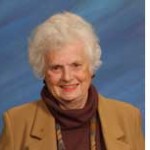By Natasha Josefowitz

LA JOLLA, California — For years family and friends have been urging me to write my autobiography. It always felt like such a daunting task, so I kept postponing even the idea of it. After a few columns about my early years in Paris and Beverly Hills were published, I was encouraged to keep writing about the various episodes of my life using my columns; somehow that felt more feasible. I have always known that separating a large task into smaller segments works, but have never applied it to my own writing.
My last column was about my college years which ended in December 1947. I graduated in three and a half years by attending summer school first at UCLA and then Berkeley, where I stayed in the International House (which is a story in and of itself). I found the diary I wrote in the spring of 1948, so my story will be seen through the eyes of a very naïve, 21-year-old, who, because of the war, had not seen much of the world. After my graduation, my parents planned to visit Europe for the first time since escaping in 1939. The ship was to leave from New York, but I had not seen anything of the United States and wanted to leave a few weeks before in order to travel on my own. The trip by train took three days and three nights. I was in a cabin that was transformed to include a bed, a toilet and a sink; I loved every minute of it.
Sally Eppenstein, a girlfriend from college who lived in Chicago, invited me to stay for a week. Her parents were welcoming. The highlights were a memorable dinner at the famous Pump Room and a visit to the stockyards (which no longer exist). I found it painful to see the cows and pigs chained upside down by their feet, still alive, rolling on an assembly line towards their eventual demise. I am still upset with the unnecessary cruelty in the way we treat the animals we use for food. I believe in the kosher way of killing animals swiftly, which prevents suffering.
My next stop was Washington, D.C. to visit my first cousin Sarah and her husband, Albert Hirschman. They showed me around the city. I was even able to witness a security council debate on Palestine. Sarah Hirschman was the founder of “Gente y Cuentos” (People and Stories), which used short stories and poems to reach people in prison, in recovery, and in senior community groups. There are over 1,000 people whose lives have been changed by the exposure to others’ life stories and the opportunity to share their own in a supportive, group setting. It became nationally known and replicated. Her daughter Katia is continuing her work in France.
Albert Hirschman, a well-known economist, volunteered to fight in the Spanish Civil War. After France surrendered to the Nazis, he worked to help many of Europe’s leading artists and intellectuals escape to the United States. He was the author of the groundbreaking book Exit, Voice or Loyalty. The concept being if dissatisfied with a current situation, you have the choice of leaving (exit), confronting (voice) or staying (loyalty) with the hope of eventually being able to make a difference.
Staying with my cousins that week in Washington, D.C. was a wonderful, intellectually stimulating experience. The opportunity to discuss ideas non-stop for a week was the best part of my trip. Building on one another’s thoughts to achieve a totally new way of thinking is something that has given me great pleasure my entire life. The “aha” moments this provides are sometimes magical. I love conversations which offer new insights and a different way of perceiving the world. Years later, when Albert was a member of the Princeton Institute of Advanced Studies, I visited them again and experienced the same intellectual excitement.
My last stop was New York City where I reconnected with my parents for a few days at the Savoy Plaza before we left for Europe. In my diary I wrote, “Wonderful New York, going out into the thin rain wearing my aunt Nina’s old fur coat now getting soaked. The sound of the nervous horns, the sounds of a city in a wet traffic jam, the theaters, the museums, Broadway at night, great crowds all with one thought: to get a cab. My taxi driver wanted to become a crooner in California, where, he said, the sun always shines.”
I loved the rain and I loved New York—so much so that I returned to live there by the end of that year.
© Natasha Josefowitz. This article appeared initially in the La Jolla Village News. You may comment to natasha.josefowitz@sdjewishworld.com